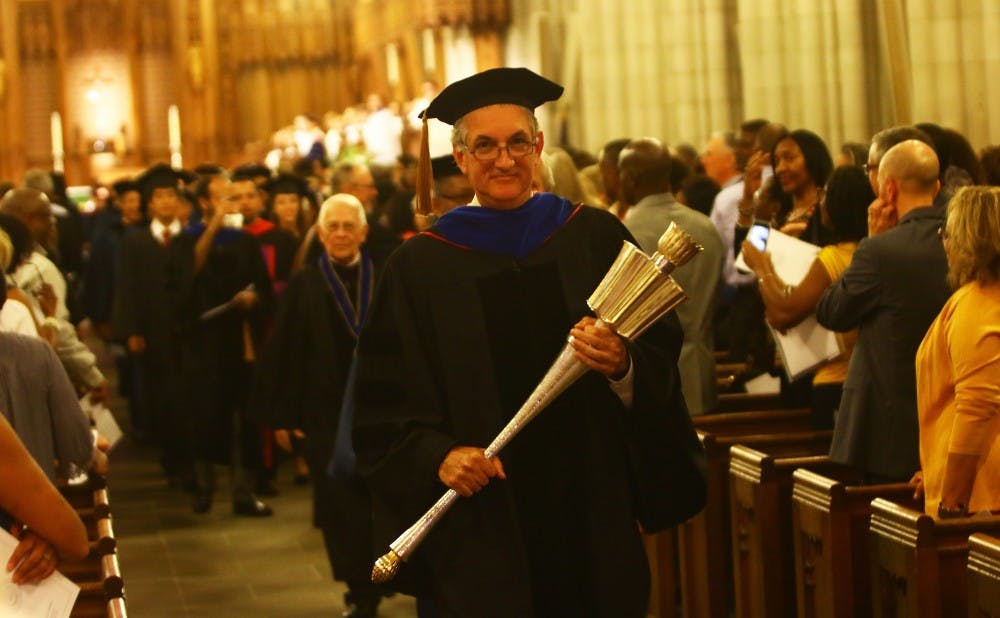Daniel Blue, Law ’73, spoke at the Founders’ Day Convocation Friday evening about lessons from the past and activism in the present day.
Students, staff and alumni gathered to celebrate the achievements of individuals at the University over the last few decades, paying remembrance to founders of the University and highlighting others who have defied overwhelming odds and fought for what they believed in. The ceremony was a part of the final weekend of the yearlong commemoration of the 50th anniversary of the first black undergraduate students to enroll at Duke.
Blue currently serves as a senator in the North Carolina Senate and became the first black chairman of the University’s Board of Trustees in 2009 after being elected to the board in 1995. He also served in the North Carolina House of Representatives from 1981 to 2002 and became the first black Speaker of the North Carolina House of Representatives from 1991 to 1994.
Blue said the first five black students came to the University to better themselves and improve the black community as well. At only 17 and 18 years old, they were prepared to face the challenges of attending a previously segregated school for the rewards a Duke education would bring, he added.
He mentioned, however, that looking at the past too closely can become a deterrent to future progress.
“We cannot allow ourselves to become paralyzed by the past,” Blue said.
Blue spoke of the difficulty the University had in breaking down the walls of segregation, noting that Duke was one of the last “good” schools to do so—starting integration in 1963.
“Duke recognized its mistakes, corrected its course and then led with great vigor and tenacity and by doing so, it moved onto the stage as a hungry, deserving and great national and international university,” Blue said, noting the importance of integration to progress.
Blue reminded the audience that the the nation is at a crossroads yet again, with different groups around the country still being refused their rights. He encouraged the audience to be proactive and follow in the footsteps of the first five black students who stood up for what they believed in.
“Duke students of today…dive in and do not let the modern day deny you justice to get their way,” Blue said.
At the end of the ceremony, President Richard Brodhead presented a number of awards.
The Alumni Distinguished Undergraduate Teaching Award was presented to Mohamed Noor, the Earl D. McLean Professor of biology and chair of the biology department. The recipient of this award is chosen through the votes of undergraduate students. In the past, Noor received the Darwin-Wallace Medal from the Linnean Society in London, which is only awarded every 50 years to recognize “major advances in evolutionary biology.”
The Distinguished Alumni Award was given to E. Blake Byrne, Trinity ‘57, an avid art collector and generous supporter of LGBT advancement on campus. He founded the Nasher Museum of Art’s national board of advisors and has supported it through donations of artwork and funds. In addition, he created a scholarship for LGBT students from the Carolinas and a professorship in arts and sciences.
“He brought his love of art and love of Duke together to make the Founders Board of the Nasher Museum of Art,” Brodhead said.
Blue and Gerald Lee Wilson, senior associate dean of Trinity College, both received a University Medal. The University Medal is given to those who have close ties with Duke and have made lasting contributions.
Brodhead noted how much Wilson is admired by students.
“[Students] ask Dean Wilson to officiate at their weddings and later at the baptism of their children,” Brodhead said.
Sophomore Kalifa Wright said Wilson’s message about seeking to make change in the future was particularly powerful.
“I really liked what he said about how staying in the past can be bad,” she said. “We should be pushing for the future. There’s still a whole lot to do, a whole lot.”
Get The Chronicle straight to your inbox
Signup for our weekly newsletter. Cancel at any time.

